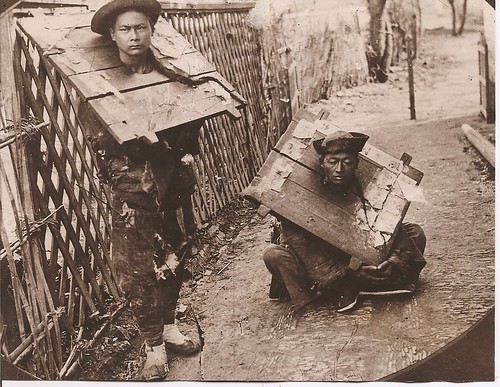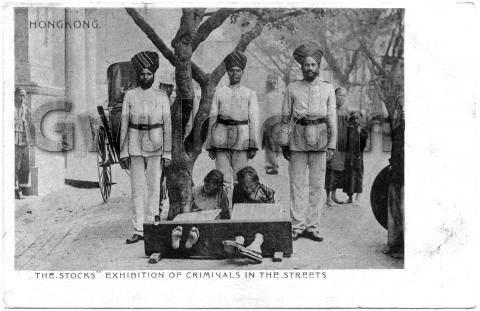The Cangue - Was it used in Hong Kong?
Primary tabs
Was the cangue used as punishment in Hong Kong, and if so during which years, and under what circumstances?
The cangue is a form of punishment that was used in China. Sometimes described as a 'wooden collar', it was a large wooden board that fastened around a person's neck. Here's a photo on Flickr that shows the cangue in use:
It had several effects:
- Shame: Apart from the obvious sign you've done something wrong, papers noting your crime would be stuck on the boards, making them clear to passers-by.
- Pain: Wearing the heavy wooden board was very uncomfortable.
- Hunger: The board was large enough that you couldn't reach your mouth with your hand, so had to rely on others to feed you.
But were they used in Hong Kong? There are several old postcards in circulation that show show petty criminals on display in Hong Kong, but they'd be shown with their legs fastened in wooden stocks:
I've seen a photo dated to the 1890s, and labelled as showing prisoners in Victoria Gaol. All the prisoners are wearing cangues.
There's a page on Wikipedia that says:
During the early colonisation of Hong Kong, prisoners in Victoria Prison were forced to parade in public, were often beaten with a cane, and their arms locked with a cangue on which their name and crimes-committed were penned. Policeman, often of Indian descent, would walk the prisoners to a plaza in front of the Man Mo Temple where the lawbreakers were scoffed and condemned by the passers-by. After a few hours, the criminal was returned to the Old Bailey Street jail. This form of punishment was abolished after World War I.
That would certainly explain the scene in the photo, however there are no sources quoted for the Wikipedia text, so I'm not sure how accurate it is.
Can anyone shed more light on this?
Thanks and regards,
David




Re: Wearing a cangue
David - Try googling 'punishment by wearing a cangue in Hong Kong'. There are some book references that indicate that the cangue was used as a form of punishment in Hong Kong.
Re: wearing a cangue
Thanks Moddsey, I'll check those and let you know what I find.
I've also noted this photo, which comes courtesy of John Breen's private collection:
The policeman looks to be in the Hong Kong uniform, so it's extra support to cangues being used in Hong Kong. The policeman's collar number is 132, if that gives anyone an idea of the date. The best guess at the moment is "1880s".
Does anyone recognise the location? I'm wondering if it was a standard place to display criminals, perhaps with some message about punishment & virtue on the chinese-language sign in between the two men. Or it could just be an advertisement for the shop behind!
Regards, David
More on the cangue
Here are some quotes from books that mention use of the cangue in Hong Kong:
Christopher Munn also found another copy of the people wearing cangues inside a jail, see:
http://www.virtualshanghai.net/Photos/Images?ID=25296
However it gives the location as Shanghai!
In summary, clear as mud...
Any and all sources of inspiration welcome,
Regards, David
Re: Stocks
Stocks & Cangue
Thanks Moddsey,
I just found a mention of the cangue in a book, "Reluctant Heroes: Richshaw Pullers in Hong Kong And Canton, 1874-1954", which says "They were to be fined $1 each, or to be shackled in the cangue, a wooden placard explaining their crimes, and then be sent out to be exposed in the market square to public ridicule for six hours (China Mail April 1, 1881)."
But when I read that copy of the China Mail, I can't find any mention of that incident.
I looked through all the issues of the China Mail for April 1881. The daily court cases and sentences are listed in the "Police Intelligence" section.
Most sentences were for imprisonment with hard labour, or fines. I didn't see any mention of the cangue. The stocks were rarely mentioned, though for some reason several people were sentenced to the stocks on 6th April 1881:
So, no sign of the cangue in use in Hong Kong.
Then how to explain the photo above that shows a policemen next to two prisoners in cangues? If it was taken in Hong Kong, possibly it was a staged photo, to have a photo of "Chinese punishment" to sell to visiting tourists.
Regards, David
Further Reading
Crime and Punishment: http://www.csd.gov.hk/misc/csd_history/pdfs/c01_c08.pdf
Court in Time: Magistrate's Court in 19th Century Hong Kong: http://www.asianreviewofbooks.com/new/?ID=683
The cangue in Hong Kong
David
This site, http://www.wattis.com.hk/gallery/3682/hong-kong-the-cangue.html for Wattis Fine Arts shows a photograph of four unfortunates wearing the cangue. It's titled 'Hong Kong - the Cangue' and dated c. 1890.
Jill
Posed cangue photograph?
David
On closer inspection, the Wattis photo looks posed to me. What are the men doing in such a grand, if dilapidated room? There's something funny about the right foot of the man on the left. Does his left foot have a shackle on it? Is the man in the middle really missing his left hand? If he has a hook, it doesn't seem to be attached. I leave it to your discerning eye to spot other anomalies. That said, the cangue might well have been used in Hong Kong before photography was prevalent. Maybe the photographer was attempting a reconstruction - in which case his subjects might even have got a small tip for their pains.
Jill
Re: Cangue in Hong Kong
Thanks Jill.
I have seen that photo before which was made into a postcard that indicated that it was taken in Canton. So can't be sure if it was taken in Hong Kong
What I have seen so far from sentences meted out by Magistrates is just exposure in stocks in public normally at the scene of the crime. Having said, I am not sure whether or not the use of stocks also included the use of the cangue.
Re: Cangue in Hong Kong
Jill & Moddsey, thanks for the extra information.
Here's another copy of the photo at the top of this page, which is described as "This is a staged photography taken in the courtyard of the photographer's studio.": http://www.virtualshanghai.net/Photos/Images?ID=14854.
The facts we've found so far point to the cangue only being used in the very early years of Hong Kong as a British colony, but stocks in use for much longer. However as Moddsey points out, it's not 100% clear whether the words cangue and stocks were used interchangeably, or if cangue only meant the board around the neck, and stocks only meant the wood fastened around the legs.
Since the majority of photos that show punishment show leg stocks, I believe the neck cangue wasn't used for many years in Hong Kong.
Regards, David
PS Here's another good CSD reference publication:
http://www.csd.gov.hk/90th_MemorialBook/hkcs_en/files/csd_en.pdf
Prisoners in Cangue
Thanks to Samson Chan, who adds these comments about the photo of the people in prison wearing a cangue (see http://www.virtualshanghai.net/Photos/Images?ID=25296):
I have looked up my own collection and tend to believe this photo was unlikely to be taken at Victoria Gaol on the following grounds:
- only stocks were mentioned in Hong Kong (Police Magistrate's comment refers)
-prisoners should be in uniform (prisoners' uniform was marked with prisoner number or regulation arrow)
-there were no Chinese warders before the War and the one in the picture look more like a policeman according to the uniform he worn. However comparing with the photo in Crisswell and Watson's book (p.48), the uniform he worn is differed from those in the book.
Samson Chan retired from the Correctional Services Department in 2006 as Assistant Commissioner, after over 30 years service. His MA thesis and PhD thesis have both looked at the history of the penal system in Hong Kong.
All current evidence indicates that this photo of prisoners wearing the cangue wasn't taken in Hong Kong.
Regards, David
Use of Stocks
1900s Prisoner in Stocks
1900s Posed Photo of Policeman in Stocks
Crime and Punishment 1841-1898
Interesting reading on the captioned topic
Note that the cangue is not mentioned.
re: Crime and Punishment
Thanks Moddsey. I'd read elsewhere that prisoners who were to be flogged would wear a cangue to their flogging, but the document you linked to in turn references this one:
The punishments inflicted on the Chinese are flogging, hard labour, and confinement. All, or nearly all, are flogged, the number of blows varying from 20 to 100. Few only receive a hundred, many have 40 or 50, the latter number is most common. these are given in public. The criminal, with a label on his back, written in Chinese characters, is conducted from the prison to the whipping stand at the west end of the Upper Bazaar, and there undergoes the sentence of the law, and returns again to prison.
Taken from: http://archive.org/stream/historylawsandc00nortgoog#page/n69/mode/1up
The emphasis is mine. It doesn't sound like a cangue.
Regards, David